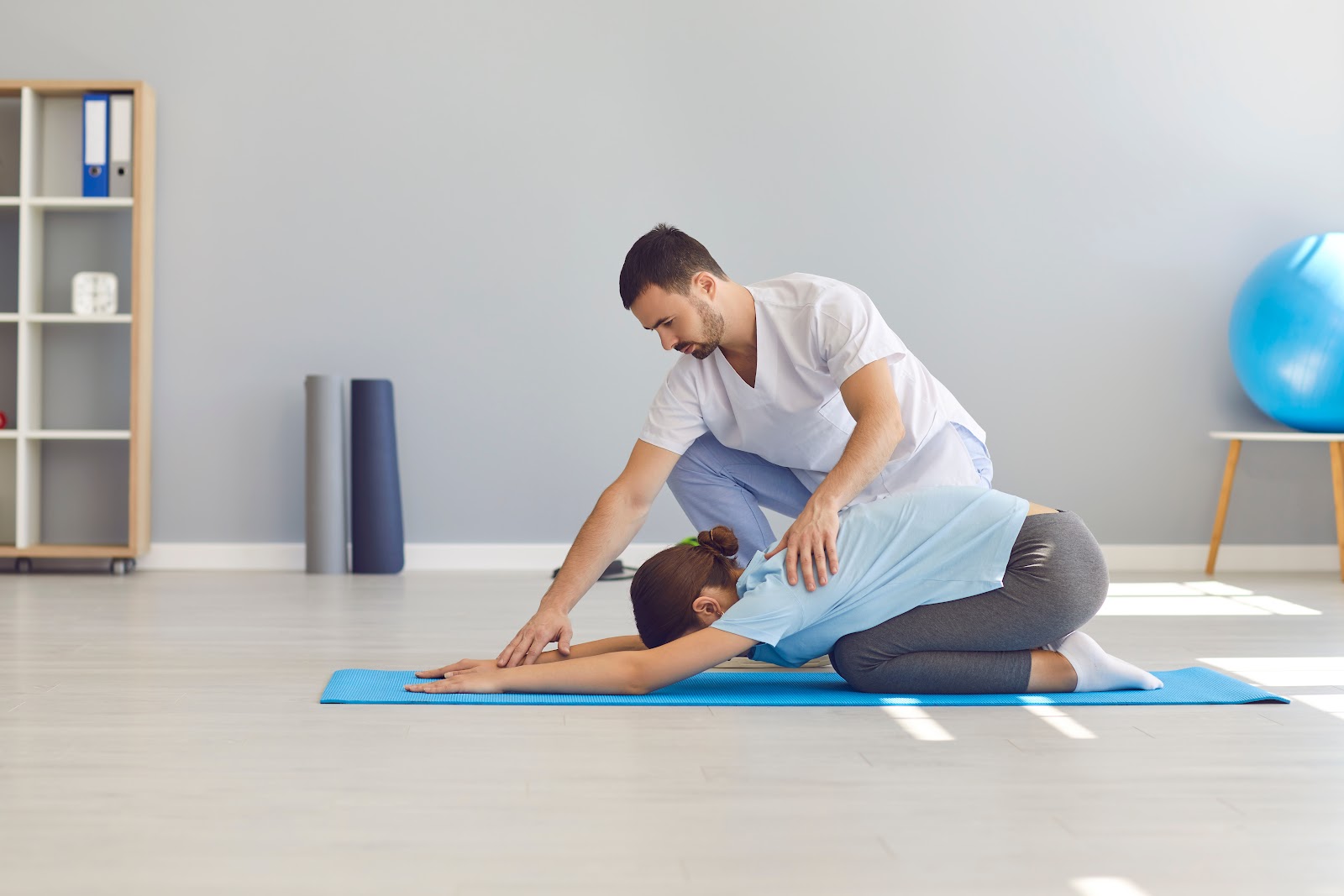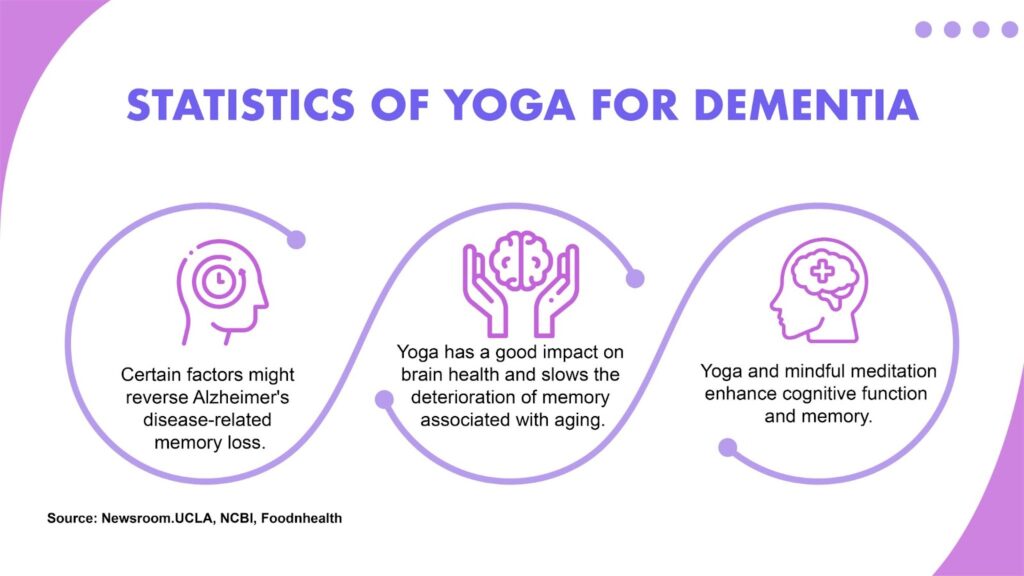Yoga is a practice that focuses on creating ties between your body, mind, and spirit to help you feel good from the inside out. It promotes brain health with cognitive functions, boosting memory, and keeping you awake.
Yoga has been practiced for centuries, and its growth in popularity has encouraged studies regarding its many physiological, mental, and emotional advantages. It is a traditional kind of exercise that enhances mood, reduces stress, and encourages flexibility. As a result, yoga has numerous benefits for those who have dementia.
Dementia symptoms range from a slow loss of memory to a reduction in comprehension, reasoning, and understanding. Yoga and meditation help to relieve dementia symptoms and even prevent dementia from developing too soon.
The Effect Of Yoga On Patients With Dementia
The major cause of dementia, which affects approximately 44 million people worldwide, is Alzheimer’s disease. Although there is no known treatment for the crippling ailment, research has shown that yoga and meditation can reduce and even eliminate its effects.
Research published in 2014 revealed that certain factors might reverse Alzheimer’s disease-related memory loss. 9 out of 10 participants showed improvement over three to six months following a challenging, 36-point therapeutic program that included yoga and meditation. Another thorough analysis of up to 11 studies found that yoga could have a good impact on brain health and slow the deterioration of memory associated with aging.
For both Alzheimer’s patients and their caretakers, yoga and meditation have a link to improved social skills and stress management. The patients and families were able to complete the exercise jointly thanks to the holistic program. As a result, the caretakers could unwind and recharge while working.
Numerous studies are being conducted to examine the advantages of yoga for people with dementia. On Dementia Talks, you may keep up with all the most recent discoveries and developments in the field of brain sciences to better understand this progressive illness. What is known regarding yoga’s advantages for a person with dementia is as follows:
1 Enhanced Recognition Training
The brain is a sophisticated organ that is adaptive and frequently thrives under stress. It is made up of countless cells called neurons that connect in an endless number of ways. We learn and change as a result of the network of these brain connections. Lack of mental exercise can make our brains less malleable, which will weaken our memory and our capacity for doing daily duties.
Yoga is a type of cognitive training in addition to physical activity. Mantras, breathing, movements, and concentration are some of the different elements that it entails. Each element stimulates the brain’s various features and encourages the formation of new connections. The cognition neurotrophic factor (BDNF), a protein involved in the growth of new neurons, is also increased by yoga and exercise.
Yoga and mindful meditation are both credited with enhancing cognitive function and memory. Comparatively to non-meditators, those who consistently practice meditation have reduced atrophy (cell degeneration) in the hippocampus, a complex brain region in charge of memory and learning.
2 Stress Reduction
Stress can hurt one’s physical and mental health. Cortisol, the stress hormone, is frequently associated with cognitive decline and brain atrophy. Chronic stress can start Alzheimer’s and dementia by further causing inflammation in the neurological system. Additionally, it can result in autoimmune disorders, diabetes, and heart conditions.
Patients with dementia who are also coping with a chronic illness may experience growing stress, overwhelm, and anxiety, especially in the early stages. Stress levels can be reduced by controlled movements and meditation that help the mind unwind. In addition to regulating blood pressure and pulse rate, mindful meditation also improves focus.
Furthermore, yoga helps prevent cognitive decline and memory loss since it encourages stress management. Additionally, restorative yoga prevents the body’s fight-or-flight response, allowing it to repair and heal. It induces serenity and calms the body and the mind. Yoga can also aid carers, who are under a great deal of stress, in overcoming depression and finding relaxation. It can refresh their body and mind, enabling them to handle the difficulties of caring for a loved one who has this crippling condition.
3 Physical Well-being
Yoga is an activity, thus it has many physical advantages for people living with dementia and helps them live more independently. It encourages flexibility, agility, and fine motor abilities.
Exercises that focus on breathing can help the lungs become stronger and more functional, lower blood pressure, and lessen stress. Regular yoga sessions can help dementia sufferers become stronger and more resilient, giving them the energy and stamina for somewhat more difficult physical exercises. Yoga postures that focus the core strength and postures that enhance balance and mobility are also available.
4 Healthy Sleep Patterns
Sleep is a crucial component of our daily cycle that encourages the rebuilding of the cells in the body and mind. For greater cognition and learning capacities, deep, restful sleep is also essential. Additionally, it strengthens the immune system and lowers stress levels.
The effects of dementia on the brain, however, cause sleep difficulties in the majority of individuals. In people with Alzheimer’s disease, it is both the most prevalent and severe. Sundowning, which results from not getting enough sleep, can make you drowsy during the day and agitated and restless at night.
They may sleep better, stay asleep longer, and feel better during the day if they regularly practice yoga. Some types of yoga can be invigorating and uplifting; as a result, they are more suited for the morning. The best type of yoga to integrate into your night regimen is restorative yoga.
To assist settle the senses before bed, restorative yoga is more suited for inclusion. Before bed, doing some mindful breathing exercises might help to calm the mind and turn off the body’s stress reaction, allowing for intact sleep.
Yoga Postures For Patients With Dementia
While it is feasible to practice yoga at home, there are many benefits when enrolling in a class created especially for elderly individuals with dementia and Alzheimer’s. It enables seniors to interact with others in comparable circumstances and feel inclusive. Engaging in a coordinated activity can also be enlightening and stimulating for both the patients and the caretakers.
Classes of gentle yoga are specially created for older persons. They move slowly to give you ample time to comprehend the pose and adjust your posture. These initiatives seek to make yoga and meditation available to those who might find it difficult to engage in more strenuous activities.
How Dementia Patients Can Make The Most Of Yoga Through Our Courses?
Dementia patients can benefit greatly from yoga. They become more mentally sharp, experience less stress, have better sleep, and are overall healthier.
Finding sustenance strategies that enhance the quality of life and give people with dementia meaningful experiences is crucial. Yoga can help with this by providing happy, successful, consistent, relieving, and restful moments. Creating a safe environment that prioritizes trust and safety, can reduce stress. Most significantly, yoga may assist everyone in finding their true selves—those aspects of who they are that never change.





